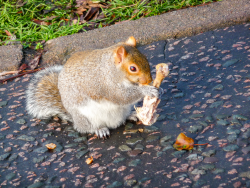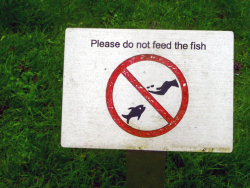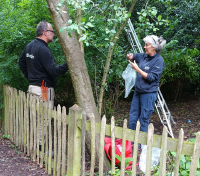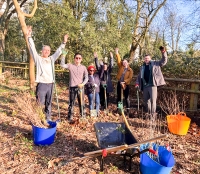2024
Please don’t feed the wildlife!

Visitors to the park have been asked not to feed the wildlife. It is not good for the wildlife and not good for the park either. Many people feed squirrels and birds because they think it is kind, but it is not. Thousands of visitors offering food does more harm than good, so we need your help to protect the wonderful wildlife we enjoy in our park.
Children, in particular, love to feed squirrels, so this is an opportunity to teach them that these charming little mammals have plenty of natural food to support them. Be kind, and let them stay wild. And remember that squirrels can bite!
The council has a page on its website, explaining the important reasons not to feed the animals, birds, or fish. You can find the information on: www.rbkc.gov.uk/parks-leisure-and-culture.
We notice that some park visitors arrive with large bags of peanuts to feed the squirrels. Please remember that some people are allergic to nuts and could suffer a serious reaction if they come into contact with nuts left on the ground in the park.

Many of London’s parks have signs saying Don’t Feed the Wildlife, so why haven’t we? Royal Parks are running a campaign: ‘Help us keep wildlife wild’ and encouraging all to help nature thrive by appreciating and observing wildlife in its natural habitat rather than seeking an up-close, personal experience. That includes choosing not to feed wildlife, because it causes harm to them and the environment. An information campaign in Holland Park is long overdue, but still expected, with posters advising people to help nature and not to feed the wildlife.
You may wonder why we have two bird feeders in the park when we are asking for your help with not feeding wildlife. The feeders are managed by the Ecology Service and are targeted at smaller songbirds whilst (hopefully) excluding squirrels. Being situated up in a tree, there is no encouragement for birds to come into direct human contact. The birds visit the feeders just like they would go to feed from berries on a tree.
Photo by Jennie Kettlewell
[November 2024]
Bird ringing demonstration
Professional ornithologist, Bill Haines, ran a bird-ringing demonstration in the Wildlife Enclosure on Saturday 5 October. 33 birds of 11 species were captured, almost half being long tailed tits and wrens, but included blackcap, chiffchaff, robin, blue tit, great tit, magpie and song thrush. There were two welcome additions of glorious goldcrests and fire crests. Numbers were slightly down on 2023, but insect and butterfly numbers are down too.
The last time a magpie was captured
.jpg)
and ringed in the park was in September 2013 and may only be the second of this species ringed in the park. The last time a firecrest was captured was in 2016 and there have been five ringed or re-trapped since 2011. The only bird that already had a ring was a blue tit that had been ringed as a juvenile at last year’s demonstration.
The demonstration involved erecting fine mist nets which do not harm the birds captured in them, and the ringing is carried out under licence. This annual event is organised by the RBKC Ecology Service and sponsored by The Friends of Holland Park.
Jennie Kettlewell
Photo by Bill Haines
[November 2024]
Kew take cuttings from rare tree

Park head gardener, Owen Rogers.
The rarest tree in Holland Park is a Styphnolobium japonicum ‘violacea’, next to the West Lawn. S. japonicum is often seen in parks, but ours is different because it’s flowers have a mauve stain in each pea-like flower. This variety flowers later than the usual form. We had hoped this tree might be accorded Champion Tree status by The Tree Register, but there is evidently a better example in Wimbledon’s Cannizaro Park. However, it is rare and even Kew Botanic Gardens don’t have one, so they gladly agreed when we asked if they would be interested in taking cuttings. The head of Kew’s propagation unit, Sal Demain, visited in person to take cuttings and is now growing these on in Kew’s tree nursery. We hope to receive one or two very small trees from her in about three years’ time.
Jennie Kettlewell
[September 2024]
Planting in Holland Park

Work continues to implement the Holland Park Woodland Management Plan and you can see where idverde’s Gerry Kelsey has led his teams of volunteers to plant hedging whips along the borders of the woodland enclosures. It is good to see planting in the park once again, and planting trees in carefully selected spaces will be next. The Woodland Trust says: “Trees are a powerful weapon in the fight against climate change, absorbing and locking up a staggering 213 million tonnes of carbon in UK woodlands. Yet the woods that we need so vitally are themselves impacted by climate change – spring now arrives on average 8.4 days earlier than the first part of the 20th century which means some wildlife is struggling to keep up. Woodland wildlife is already under immense pressure…” We must ensure that future generations can enjoy tranquil green space in Holland Park.
[May 2024]
